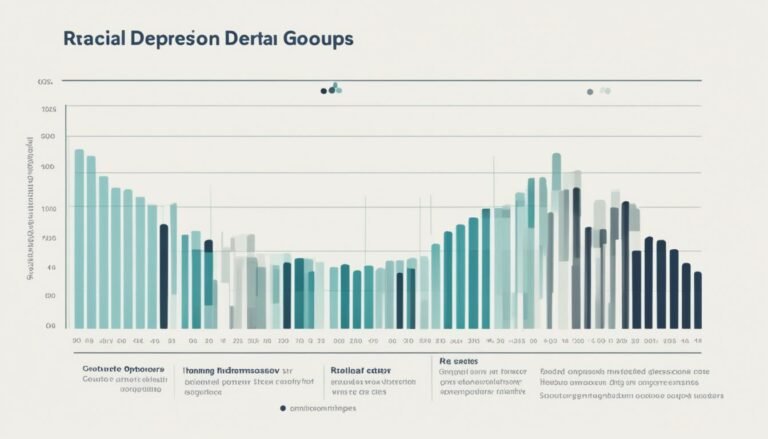Is Schizophrenia More Common in Certain Races?
Schizophrenia is a complex mental illness that affects individuals regardless of their race or ethnicity. However, research has shown that there are racial disparities in the prevalence and diagnosis of schizophrenia. Understanding these disparities is crucial for providing equitable care and addressing the specific needs of different racial groups.
Key Takeaways:
- Black Americans are diagnosed with schizophrenia at higher rates than White Americans.
- Assessment bias and environmental risk factors may contribute to these disparities.
- More research is needed to understand the relationship between race and schizophrenia prevalence.
- Racial disparities in diagnosis and treatment highlight the need for interventions and cultural competency in mental health care.
- Improving diagnostic accuracy and reducing bias can help address racial disparities in schizophrenia diagnosis.
Why Diagnosis is Difficult
Schizophrenia is a severe and chronic mental illness that interferes with cognitive abilities, socialization, and emotional management. Symptoms of schizophrenia can include delusions, hallucinations, disorganized speech, a lack of motivation, difficulty sustaining relationships, and impaired decision-making.
Diagnosing schizophrenia can be challenging as symptoms can overlap with other mental health conditions, and it often requires eliminating other potential causes of psychosis. Early stages of schizophrenia may present with non-specific symptoms, making it difficult to differentiate from other conditions. Comprehensive treatment involving medication and therapy can be highly effective in managing and improving the lives of individuals with schizophrenia.
Despite advancements in psychiatric research and diagnostic tools, difficulties still exist in accurately diagnosing schizophrenia. The complexities surrounding the diagnosis of this complex mental disorder make it a daunting task for practitioners. There are various challenges and intricacies involved in the diagnostic process, which can contribute to the difficulties faced.
- Overlap with other mental health conditions:
One of the primary challenges in diagnosing schizophrenia is the overlap of its symptoms with other mental health conditions. Symptoms such as hallucinations, delusions, and disorganized speech can also be present in disorders like bipolar disorder, schizoaffective disorder, and substance-induced psychosis. Distinguishing between these disorders can be challenging, requiring careful evaluation and differentiation.
- Subjectivity and variability of symptoms:
The symptoms of schizophrenia can vary widely from person to person and may change over time. The severity and frequency of symptoms can fluctuate, making the diagnostic process complex. Additionally, individuals with schizophrenia may not always exhibit all the hallmark symptoms, further complicating the diagnosis.
- Lack of objective diagnostic tests:
Unlike certain physical illnesses where diagnostic tests provide definitive evidence, schizophrenia lacks specific biomarkers or laboratory tests that can confirm the diagnosis. Diagnosis relies heavily on clinical evaluation, patient history, and observation of symptoms, which can be subjective and open to interpretation.
- Stigma and reluctance to seek help:
Mental health stigma often deters individuals from seeking help or disclosing their symptoms to healthcare professionals. This can delay the diagnosis and initiation of appropriate treatment, further exacerbating the difficulties in diagnosing schizophrenia.
Despite these challenges, early detection, accurate diagnosis, and comprehensive treatment are crucial for individuals with schizophrenia. Prompt intervention and ongoing management can help alleviate symptoms, improve functioning, and enhance overall quality of life for individuals with this complex mental disorder.
“The diagnosis of schizophrenia is like a puzzle, with many pieces that need to come together to form a complete picture. It requires a thorough assessment and careful consideration of different factors to make an accurate diagnosis.”
Race and Schizophrenia
Schizophrenia is only partially determined by genetics, and environmental factors play a significant role in its development. Marginalization, trauma, and stress are known risk factors for schizophrenia, and Black Americans may face higher levels of these factors due to systemic and interpersonal racism.
The experience of racism, including police brutality, may contribute to the higher rates of schizophrenia observed among Black Americans. However, it is important to note that being Black does not make an individual more likely to have schizophrenia. Instead, the impact of racism and associated stressors may increase the likelihood of developing schizophrenia.
The Impact of Racism and Stress
Racial disparities in schizophrenia prevalence can be attributed to the social and environmental factors that individuals of different races face. The increased exposure to discrimination, prejudice, and unequal access to resources can lead to chronic stress and trauma, which are known risk factors for the development of schizophrenia.
“The experience of racism, including police brutality, may contribute to the higher rates of schizophrenia observed among Black Americans.”
Research has shown that individuals who have faced racial discrimination are more likely to experience symptoms of psychosis and have a higher risk of developing schizophrenia compared to those who have not faced such discrimination.
Addressing Racial Disparities
In order to address the racial disparities in schizophrenia diagnosis and treatment, it is crucial to address the underlying systemic and interpersonal racism that contributes to increased stress and trauma among racial minorities.
Efforts should be focused on providing culturally competent mental health care and promoting early intervention to minimize the impact of schizophrenia. Increasing diversity in the mental health workforce and educating clinicians about the influence of race and racism on mental health can also contribute to more accurate diagnoses and equitable treatment.
Could There Be Diagnostic Disparities?
Research suggests that there may be diagnostic disparities in the diagnosis of schizophrenia among different racial groups. Some symptoms of schizophrenia, such as psychosis, can overlap with other mental health conditions like bipolar disorder. There is evidence to suggest that clinicians may overemphasize psychotic symptoms in Black patients while underemphasizing mood symptoms, leading to overdiagnosis of schizophrenia in this population. Misdiagnosis of severe depression as schizophrenia has also been observed among Black patients, potentially due to racial bias in the diagnostic process. These diagnostic disparities can lead to incorrect treatment and impact an individual’s overall mental health.
| Diagnostic Disparities in Schizophrenia | Racial Biases in Diagnosis | Underdiagnosis of Mood Disorders in Black Patients | Overdiagnosis of Schizophrenia in Black Patients |
|---|---|---|---|
| • Overemphasizing psychotic symptoms | • Racial bias in the diagnostic process | • Mood symptoms underemphasized | • Severe depression misdiagnosed |
| • Potential overdiagnosis of schizophrenia | • Impact on treatment decisions | • Incorrect treatment approaches | • Negative impact on mental health |
| • Disproportionate focus on symptoms | • Addressing racial biases in diagnosis | • Limited recognition of mood disorders | • Importance of accurate diagnosis |
“The diagnostic disparities in schizophrenia diagnosis across racial groups highlight the need for more awareness and sensitivity during the diagnostic process. Overemphasizing psychotic symptoms in Black patients while underemphasizing mood symptoms can result in overdiagnosis of schizophrenia. Additionally, misdiagnosis of severe depression as schizophrenia can occur due to racial bias. These diagnostic disparities can have detrimental effects on an individual’s mental health and influence treatment decisions. It is crucial to address and rectify these disparities to ensure accurate diagnoses and appropriate treatment for all individuals.”
Trauma and Schizophrenia
Trauma plays a significant role in the development of schizophrenia, and racial minorities, including Black Americans, are more likely to experience traumatic events. The effects of trauma on schizophrenia prevalence have been widely studied, revealing a strong correlation between the two. Trauma and adversity, such as physical or sexual abuse, domestic violence, and exposure to violence, increase the risk of psychosis, including schizophrenia.
Racial disparities in trauma experienced by Black individuals may contribute to the higher observed rates of schizophrenia in this population. The chronic stress of living in environments with systemic racism and limited access to resources further amplifies the likelihood of developing schizophrenia. The impact of trauma on schizophrenia prevalence underscores the importance of addressing and reducing traumatic experiences, particularly within marginalized communities.

Understanding the Connection
Research has highlighted the complex relationship between trauma and schizophrenia. Traumatic events can disrupt brain development, lead to changes in key neurotransmitters, and trigger a cascade of physiological responses that increase susceptibility to mental health disorders, including schizophrenia. Trauma can also exacerbate existing genetic vulnerabilities, compounding the risk.
“Unresolved trauma can have profound effects on an individual’s mental well-being, potentially manifesting as severe psychiatric conditions like schizophrenia.” – Dr. Jane Thompson, Psychiatrist
The relationship between trauma and schizophrenia supports the need for comprehensive trauma-informed care, which recognizes and addresses the impact of trauma on mental health. By incorporating trauma-focused interventions and therapies into treatment plans, clinicians can improve outcomes for individuals with schizophrenia.
Breaking the Cycle
To reduce racial disparities in trauma and schizophrenia, it is essential to address the root causes of trauma, such as systemic racism and social inequalities. This requires promoting social justice, providing equitable access to resources, and implementing trauma-informed practices across institutions and communities.
- Educating mental health professionals about the intersection of trauma, race, and schizophrenia.
- Implementing trauma screenings and assessments to identify individuals at risk.
- Providing culturally competent and trauma-informed therapies that address the unique needs of racial minority populations.
- Advocating for policies that address systemic racism and support marginalized communities in accessing resources for trauma recovery.
By prioritizing trauma-informed care and addressing racial disparities in trauma prevalence, we can create a more equitable and supportive environment for individuals impacted by schizophrenia.
A Possible Solution for Racial Disparities in Schizophrenia Misdiagnosis
Addressing racial disparities in schizophrenia diagnosis is crucial for ensuring equitable mental healthcare for all individuals, regardless of their race or ethnicity. To reduce bias and improve diagnostic accuracy in racial minority patients, implementing a more deliberate and structured clinical interview process can be highly effective.
By following a consistent pattern during the diagnostic process, clinicians can minimize the potential for bias and ensure a fair assessment of symptoms. This approach involves carefully evaluating all aspects of the patient’s condition, including both psychotic and mood symptoms. It is important to avoid overemphasizing psychotic symptoms in racial minority patients while underemphasizing mood symptoms.
“By implementing a more deliberate and structured clinical interview process, clinicians can minimize bias in schizophrenia diagnosis and ensure accurate assessments.”
In addition to the interview process, having mental health practitioners who share the same racial or ethnic background as the patients can also contribute to reducing bias in schizophrenia diagnosis. Research has shown that individuals tend to feel more comfortable and understood when they have healthcare providers who share similar cultural experiences. Having a diverse healthcare workforce that reflects the demographics of the patient population can help improve diagnostic accuracy and promote better mental healthcare outcomes.
Early intervention and personalized, comprehensive treatment are vital for minimizing the impact of schizophrenia in racial minority patients. By detecting the illness early on and providing appropriate support, healthcare providers can help individuals manage their symptoms effectively and improve their overall quality of life.
Efforts to address racial disparities in schizophrenia diagnosis extend beyond the clinical setting. It is essential to tackle systemic racism and increase cultural competency among mental health professionals. This includes raising awareness, providing training on cultural sensitivity, and fostering an inclusive healthcare environment where all patients can receive equitable care.
The Very Human Cost of Misdiagnosis
Misdiagnosis of schizophrenia can have serious consequences for individuals, especially when it leads to incorrect treatment and inadequate care. The consequences of misdiagnosis in schizophrenia can be far-reaching and impact various aspects of an individual’s life. Black patients, in particular, face unique challenges and disparities in schizophrenia treatment and care.
- Impact of Misdiagnosis on Black Patients: Misdiagnosis can significantly affect the well-being and quality of life of Black patients with schizophrenia. It can lead to delays in receiving appropriate treatment, resulting in prolonged suffering and functional impairment. Misdiagnosis can lead to increased hospitalizations, as individuals may experience worsening symptoms without proper intervention.
- Disparities in Schizophrenia Treatment and Care: Black individuals diagnosed with schizophrenia often experience disparities in treatment and care. They may receive higher doses of antipsychotic medications and be prescribed older medications instead of newer ones. This can result in adverse side effects and suboptimal outcomes. Additionally, lower engagement in treatment by Black patients contributes to poorer treatment outcomes and a heavier burden on individuals and their families.
- Financial and Social Consequences: Misdiagnosis can also have financial and social consequences for individuals and their families. Inaccurate diagnosis and treatment may prevent individuals from participating fully in work, education, and social activities. This can lead to economic instability, reduced social support, and isolation.
The impact of misdiagnosis in schizophrenia goes beyond the individual level, affecting families, communities, and society as a whole. Improved diagnosis accuracy and equitable treatment for individuals with schizophrenia, regardless of their racial or ethnic background, are essential for minimizing the human cost of misdiagnosis.
| Consequences of Misdiagnosis in Schizophrenia | Impact on Black Patients | Disparities in Treatment and Care |
|---|---|---|
| Delayed access to appropriate treatment | Increased hospitalizations | Higher doses of antipsychotic medication |
| Worsening symptoms and functional impairment | Suboptimal treatment outcomes | Prescription of older medications |
| Financial and social consequences | Reduced engagement in treatment | Lower treatment adherence |
Improving diagnostic accuracy, reducing biases in diagnosis, and addressing racial disparities in schizophrenia treatment and care are crucial steps in minimizing the very human cost of misdiagnosis. These efforts require a comprehensive approach that includes increased cultural competency among mental health professionals, improved access to resources, and the elimination of systemic inequalities in healthcare.

Conclusion
The prevalence of schizophrenia varies among different racial groups, with higher rates observed among Black Americans compared to White Americans. This highlights the presence of racial disparities in the diagnosis and treatment of schizophrenia, emphasizing the need for further research and interventions to address these inequalities.
Understanding the complex interplay between genetics, environmental factors such as trauma and racism, and biases within the healthcare system is crucial for improving diagnostic accuracy and providing equitable care for individuals with schizophrenia. Efforts should be made to increase cultural competency among mental health professionals, reduce bias in the diagnostic process, and promote early intervention.
By addressing racial disparities in schizophrenia diagnosis and treatment, it is possible to minimize the impact of the condition and improve outcomes for all individuals, regardless of their race or ethnicity. However, achieving this goal requires ongoing research, comprehensive policies, and a commitment to prioritize mental health equity in society.
FAQ
Is schizophrenia more common in certain races?
Numerous studies have shown that Black Americans are diagnosed with schizophrenia at higher rates than White Americans.
Why is the diagnosis of schizophrenia difficult?
Diagnosing schizophrenia can be challenging as symptoms can overlap with other mental health conditions, and it often requires eliminating other potential causes of psychosis.
What is the relationship between race and schizophrenia?
There are racial disparities in schizophrenia diagnosis, with Black Americans being diagnosed at higher rates. The impact of systemic racism and associated stressors may increase the likelihood of developing schizophrenia.
Could there be diagnostic disparities in schizophrenia?
Yes, there may be diagnostic disparities in the diagnosis of schizophrenia among different racial groups. Clinicians may overemphasize psychotic symptoms in Black patients while underemphasizing mood symptoms, potentially leading to overdiagnosis of schizophrenia in this population.
How does trauma relate to schizophrenia?
Trauma plays a significant role in the development of schizophrenia, and racial minorities, including Black Americans, are more likely to experience traumatic events. Racial disparities in trauma experienced by Black individuals may contribute to the higher observed rates of schizophrenia in this population.
What is a possible solution for racial disparities in schizophrenia misdiagnosis?
A more deliberate and structured clinical interview process could be implemented to reduce bias in the diagnosis. Having practitioners of the same racial group as patients may also lead to more accurate diagnoses.
What are the consequences of misdiagnosis in schizophrenia?
Misdiagnosis can result in individuals not receiving appropriate treatment for their actual mental health conditions, and it may lead to poorer outcomes and increased burden on individuals and their families.
What is the conclusion regarding schizophrenia prevalence by race?
Racial disparities in schizophrenia diagnosis and treatment highlight the need for further research and interventions to address these disparities and provide equitable care for individuals with schizophrenia.






